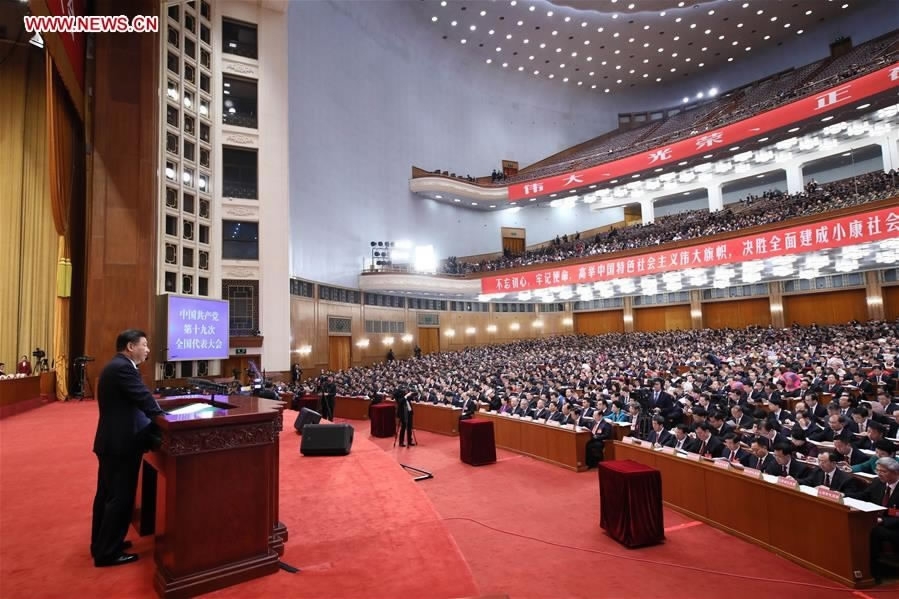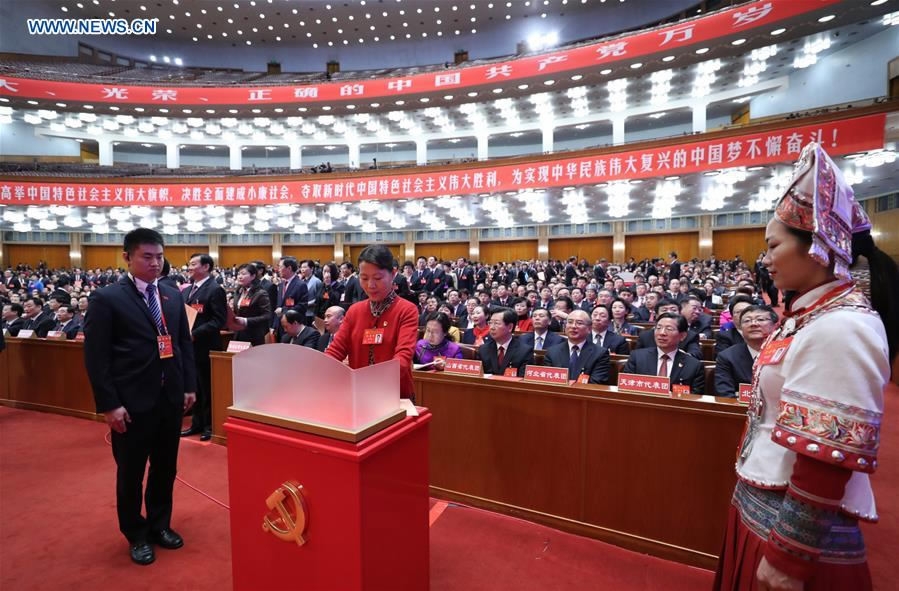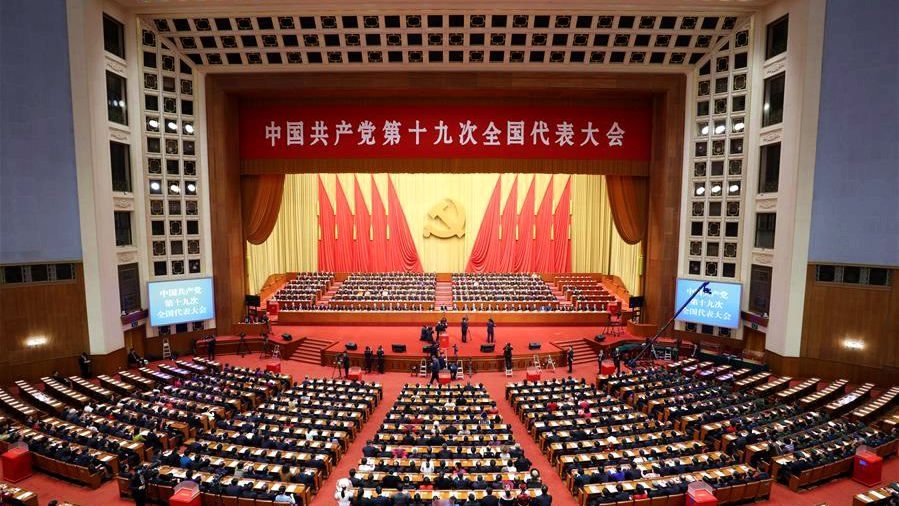In his report to the 19th National Congress of the Communist Party of China (CPC), Xi Jinping used the word "most" 33 times to emphasize the goals, the tasks and the problems facing the CPC in its efforts to push forward the cause of Socialism with Chinese characteristics for a New Era.
In Chinese, the word "most" means the "highest level." It is used to express the CPC’s clear understanding of the current situation, profound thinking of the country’s future fate, serious consideration of the people’s livelihood and resolute determination to achieve greater success.
Let’s take a look at some of the sentences containing the magic word "most" and find out their implications.

Xi Jinping delivers a report to the 19th National Congress of the Communist Party of China (CPC) on behalf of the 18th Central Committee of the CPC at the Great Hall of the People in Beijing, capital of China, Oct. 18, 2017. The CPC opened the 19th National Congress at the Great Hall of the People Wednesday morning. /Xinhua Photo
Xi Jinping delivers a report to the 19th National Congress of the Communist Party of China (CPC) on behalf of the 18th Central Committee of the CPC at the Great Hall of the People in Beijing, capital of China, Oct. 18, 2017. The CPC opened the 19th National Congress at the Great Hall of the People Wednesday morning. /Xinhua Photo
The most prominent problem
After reviewing achievements of the CPC’s work over the past five years, Xi first used the word "most" to describe the challenge for the Party’s leadership: to tackle the most prominent problems that "prompt the strongest public reaction and that threaten to erode the very foundation of the Party’s governance."
As an old Chinese saying goes, "the water can either carry a boat or overturn it." Here, the "water" refers to the people while the "boat" refers to the Party’s leadership. The old saying best illustrates the relationship between the Party and people – only by taking good care of the people’s needs can the CPC win their support. That’s why the CPC has made it a basic principle to serve the people wholeheartedly.
In his report, Xi once again stressed the importance of the basic principle: "The original aspiration and the mission of Chinese Communists is to seek happiness for the Chinese people and rejuvenation for the Chinese nation. This founding aspiration, this mission, is what inspires Chinese Communists to advance. In our Party, each and every one of us must always breathe the same breath as the people, share the same future, and stay truly connected to them. The aspirations of the people to live a better life must always be the focus of our efforts. We must keep on striving with endless energy toward the great goal of national rejuvenation."
In order to ensure that the aspiration and mission be carried out by all the Party members, the CPC has adopted the eight-point decision on improving Party and government conduct to fight against the practice of bureaucratism, hedonism, and privilege seeking. Disciplinary inspections have cut like a blade through corruption and misconduct at all levels. As a result, the goal of creating a deterrent against corruption has been initially attained; the cage of institutions that prevents corruption has been strengthened; and moral defenses against corruption are in the making. The anti-corruption drive has built into a crushing tide, is being consolidated, and continues to develop. The Party’s ability to innovate, power to unite, and energy to fight have all been significantly strengthened.

A delegate casts ballot in the election of the new Central Committee and the new Central Commission for Discipline Inspection of the Communist Party of China (CPC) during the closing session of the 19th CPC National Congress at the Great Hall of the People in Beijing, capital of China, Oct. 24, 2017. /Xinhua Photo
A delegate casts ballot in the election of the new Central Committee and the new Central Commission for Discipline Inspection of the Communist Party of China (CPC) during the closing session of the 19th CPC National Congress at the Great Hall of the People in Beijing, capital of China, Oct. 24, 2017. /Xinhua Photo
The most profound change
The 19th CPC National Congress which concluded on October 24 has decided to embody Xi Jinping Thought on Socialism with Chinese Characteristics for a New Era in the Party’s guiding ideology.
The Thought is the result of theoretical explorations and theoretical innovations based on adapting Marxism to the Chinese context and it encapsulates the practical experience and collective wisdom of the Party and people.
In his report to the Party Congress, Xi summarized the most profound change brought by the CPC since its establishment in 1921. With decades of hard work and sacrifices, the CPC has successfully led the Chinese people in gaining national independence and liberation, as well as building a stronger and more prosperous country. China has changed from a poor country to the world’s second largest economy and also has become an important player on the world stage. Socialism with Chinese characteristics has crossed the threshold into a new era.

Journalists work during the closing session of the 19th National Congress of the Communist Party of China (CPC) at the Great Hall of the People in Beijing, capital of China, Oct. 24, 2017. /Xinhua Photo
Journalists work during the closing session of the 19th National Congress of the Communist Party of China (CPC) at the Great Hall of the People in Beijing, capital of China, Oct. 24, 2017. /Xinhua Photo
The most important reality
Although the New Era means a new mission, new tasks and new requirements for the CPC, Xi said in his report that the whole Party must be completely clear about the most important reality, namely the country is still at the primary stage of socialism and China’s international status as the world’s largest developing country has not changed.
In line of this, a few key issues were discussed in his report:
- The principal contradiction facing Chinese society in the New Era has become the contradiction between unbalanced and inadequate development and the people’s ever-growing needs for a better life, which include not only material and cultural needs but also needs for democracy, rule of law, fairness and justice, security, and a better eco-environment.
- The general task of upholding and developing socialism with Chinese characteristics in the New Era is to realize socialist modernization and national rejuvenation. A two-step approach has been approved. First, to build a moderately prosperous society in all respects by 2035; second, to build China into a great modern socialist country that is prosperous, strong, democratic, culturally advanced, harmonious, and beautiful by the middle of the century.
- The path of socialism with Chinese characteristics is the only path to the country’s modernization and a better life for the people. The theory of socialism with Chinese characteristics is the right theory to guide the Party and people to realize national rejuvenation. The system of socialism with Chinese characteristics provides the fundamental institutional guarantee for progress and development in contemporary China.
(With a doctoral degree in communications from the China University of Communications, the author has been working in the field of international journalism for 30 years. The article reflects the author's opinion, and not necessarily the view of CGTN. )






